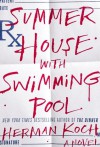The Millennials
 This book had really good potential. I began reading it as I wanted to learn more about my generation as a whole and how I compared myself with them. What I got was a father/son duo that continuously slung their religious beliefs at me.
This book had really good potential. I began reading it as I wanted to learn more about my generation as a whole and how I compared myself with them. What I got was a father/son duo that continuously slung their religious beliefs at me. There were however, a few things the father/son went over that I did enjoy. The two took the results of a (small, in my opinion 1200 millennials) and broke down their findings. And I found myself relating to and agreeing with what many of their interviewees had to say. Degrees and letters after a name are just that to me: letters. With the millennial generation being the most educated generation so far going to college and beyond has become expected from us. I admit getting my degree wasn't that big of a deal. Some days it was nothing more than a hassle dealing with admissions and what have you at the university.
Another section I agreed with was how the millennial generation found it difficult to work in some situations. The millennial generation works different from the previous two generations and that can get sticky. I've encountered situations first hand when I find myself working with Generation Xer's and their "do as your told" attitude and my attitude of "but that doesn't make sense let's do this logically". I find that millennials are challenging the status quo at work as well as butting heads with employers who still think they're employing people born in the 60's. That's not getting us anywhere and a part of me would really like to ship this book off to a bunch of people.
Speaking of work, the book also talks about how much the millennial values their family and friendships. That they're willing to take extra vacation days when offered over a financial raise. That there is more to life than work and I couldn't agree more. My job is not who I am.
The last topic I found myself nodding in agreement with was the topic of religion. For whatever reason my generation doesn't practice a structured religion that much. We are spread out in a vast array of believers, nonbelievers, confused, and open-minded. The book concluded that organized religion just isn’t' doing much for us these days. And I agree. Again, churches are run by Baby Boomers who are having a tough time reaching out to younger generations-if they're doing so at all. My generation likes to take action rather than throwing money at the problem. Go on missionaries rather than donate the money to it. Also, the book states how we've seen such corruption in the church in recent years that we're turned off by it. We've gone onto practicing and worshiping on our own ways and we're fine with that. It's the other generations that have a problem.
Where the book fell flat for me, besides the terrible writing and editing and blatant opinions, were how much the millennial seemed to rely on their parents. Perhaps I'm just a minority here but I didn't understand. I got how our parents, most of them from the Baby Boom generation became "helicopter" parents to us in a way to overcompensate not getting what they needed from their parents as a child, but wouldn't that make us reel away from them? I know it did to me. The clingier my mom is, the less I call. But coming back to that helicopter parent notion, it makes sense why the millennials are so confused about financials and saving money and all that good stuff. Because our parents did all that for us. Now we've found ourselves grown and on our own and can't comprehend what's happening when we try to use our debit card with no money in the bank. But don’t worry, our helicopter parents will just write a check to cover us.
All that being said, I think this book could have been cut down to half. There was a lot of fluff that did not belong in this book and much more that was repeated more than twice. I could have done without a rundown of the history of communication devices, different family sitcoms throughout the years and Bible passages, but what can you do? While I read the book and got a glimpse of the childhood of the co-author, I began to get a sense of how well off his family is. Having a laptop with internet access in '95 wasn't common. Neither was having a cell phone in the eighth grade.
I'm not sure who this book is directed towards. The cover art suggests the millennial generation but the over-descriptive paragraphs that explain how the internet came to be are geared more towards my parents.
Trust me; you do not brief me on The Oregon Trail.







